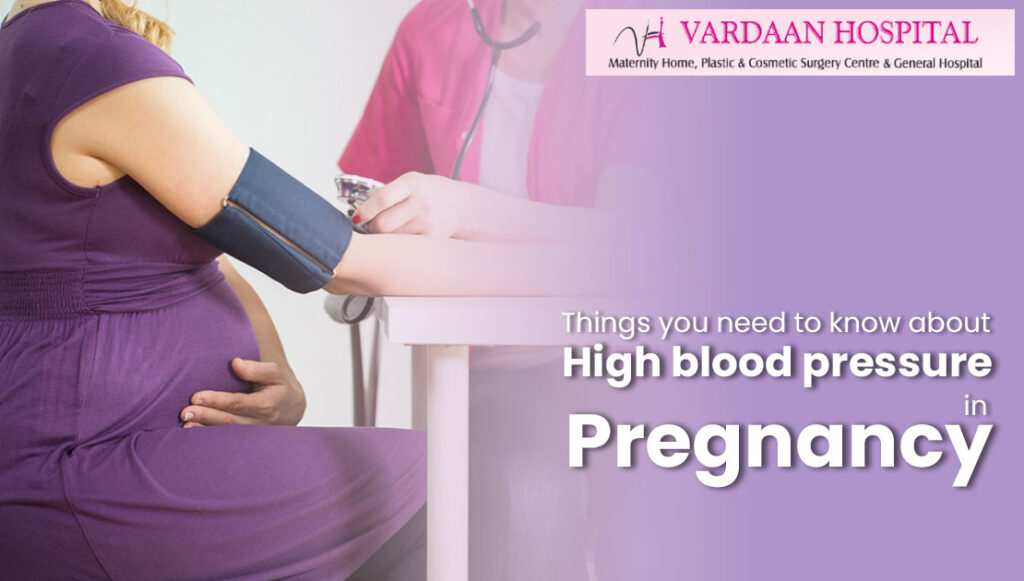Introduction
Hypertension or in common language also known as high blood pressure occurs when the force exerted by the arteries on the blood is too great. This can be dangerous during pregnancy and can lead to some complications. Here we discuss the different types of blood pressure that happen during pregnancy, its symptoms, complications, and management.
Which are the different types of blood pressure seen during pregnancy?
The different types of blood pressure observed during pregnancy are as follows•
Pregnancy-induced hypertension: This type of hypertension develops after you are pregnant. It normally starts after you hence crossing your 20th week of pregnancy. It increases your risk of developing chronic hypertension in a fraction of women with preeclampsia in the future but it disappears within 3 months after your delivery. In case of severe conditions, it can cause pre-term birth of a baby or low birth weight.
•
Chronic hypertension: This type of hypertension usually begins before you get pregnant or before the 20th week of pregnancy. It is a bit difficult to pinpoint at what exact time this hypertension began.
• Preeclampsia: This type of hypertension begins after the
20th week of pregnancy and occurs immediately. It can cause serious damage to the organs such as the
kidneys, liver, brain, etc. This occurs in the last trimester of your pregnancy. Sometimes symptoms may not be observed until delivery, which is known as postpartum
preeclampsia.
• Eclampsia: A condition where seizures happen during pregnancy or not long after the baby is born in a woman.
What are the symptoms of high blood pressure in pregnancy?
Possible symptoms of high blood pressure are as follows• Swelling in the hands, and feet.
• Persistent headache that refuses to fade away on its own.
• Breathing problems.
• Proteinuria.
• Vision problem which may manifest itself in form of blurred vision or seeing spots.
• Pain especially in the upper right abdomen.
Which complications can occur due to high blood pressure during pregnancy?
•
Less blood flow to the placenta: If the blood flow to the placenta is compromised then a number of problems can arise such as premature birth due to fewer nutrients and oxygen delivered to the baby. Premature babies can suffer from breathing issues and increased chances of developing infection among a host of other problems.
•
Separation of the placenta: Here, the placenta dislodges from the inner wall of the uterus. when the placenta separates from the inner wall there is a rupture of blood vessels which leads to serious bleeding and can become a threat to life for both the mother and her baby.
•
Intrauterine growth restriction: High blood pressure may cause the growth of the baby to become slowed or reduced.
•
Damage to other organs: When your blood pressure is not controlled it can lead to hemorrhage and internal bleeding as blood vessels can burst which can lead to internal bleeding and can be life-threatening if damage to organs such as the heart, lungs, kidney, liver occurs
•
Future cardiovascular disease: If you have preeclampsia then your chances of developing cardiovascular diseases increases and it becomes even more if you had preeclampsia more than once.
•
Eclampsia: A very serious complication in which the mother can develop convulsions or fit which can lead to maternal acidosis, maternal and fetal hypoxia, CNS damage, and trauma where white matter lesions can occur leading to irreversible cognitive/psychological effects, etc.
What are the management options for hypertension during pregnancy?
Hypertension can be managed by a few measures can be taken such as• Attending all scheduled prenatal visits
• Ask your gynecologist before taking any medicine for hypertension and also ask a safe dose but follow the dosage daily and don’t skip it.
• Do daily exercise in moderation and keep yourself healthy and active
• Eat a balanced and healthy diet while avoiding foods high in sodium such as canned foods, soups, ready-to-eat meals, burgers, pizza, and other junk foods.
• Ditch smoking and alcohol.Your
gynecologist is the best guide on when to deliver the baby. If your blood pressure is consistently elevated or if the fluid level has reduced or if the baby’s development is not proper then these are the signs your gynecologist will ask to proceed with the delivery.

